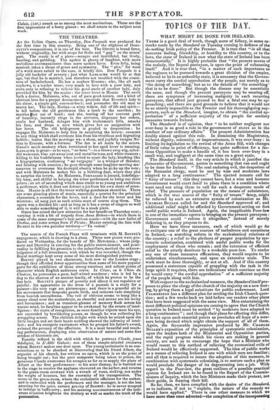THE THEATRES.
AT the Italian Opera, on Thursday, Don Pasquale was produced for the first time in this country. Being one of the slightest of Dom- zErres compositions, it is one of his best. The libretto is broad farce, without originality, but with scope for frolic and " gag " on the actors' part. The music is of a piece—meagre and inartificial, but lively, bustling, and gabbling. The upshot is plenty of laughter, with more melodious accompaniment than mere spoken farce. Even folly, being musical, takes a shape of grace and symmetry. The "plot," for want of a word more suited to the case, is briefly this. Don Pasquale is a jolly old bachelor of seventy ; just what LARLACHE would be at that age, but that he is married, and therefore not troubled with the crusti- ness of bachelorhood. He has a nephew Ernesto ; who, like all such nephews, is a tender tenor, very much in love with a poor lady, and stern only in refusing to relieve his good uncle of another lady, duly provided for him by the senior : the tenor lover is MARIO. The uncle hath a doctor, Malatesta, who, out of pure good-nature, and a kind of abstract love for a proper denouement, pretends that Ernesto's lady is his sister, a simple girl, convent-bred ; and persuades the old man to marry her. The lady, Norina—a witty widow, full of life and spirit— is led before the old gentleman like a lamb to the sacrifice; he marries /her out of hand ; and she, tearing off her convent garb of humility, instantly rings in the servants, dispenses her orders, snubs her husband, deluges him with tradesmen's bills, smacks his face, and drops a note which gives her an assignation with her lover. The old bridegroom is goaded to desperation : he engages Dr. Malatesta to help him in surprising the lovers; consents to any thing which shall extricate him from his tronblous and degrading bobble; learns that the marriage was a sham, and joyfully resigns No- rina to Ernesto, with a fortune. The fun is all made by the actors. Gamr's mock-modesty when introduced to her aged lover is amusing. -LABLacitz is great—as he says, "re-born "—in a brown crop wig, splen- did waistcoat, blue cut-away coat and metal buttons, and white trousers ; killing in his bashfulnesss when invited to court the lady, blushing like a hippopotamus, confessing " mi vergogno " in a whisper of thunder, and fainting with emotion ; he goes through some laughter-moving ma- t:louvres to overcome his decrepid obesity when he piaks up the note; and with Malatesta he makes fun in a babbling duet, where they plot to surprise the lovers. As Malatesta, FORNASARI is jocund, indefatiga- bly busy, and skilful in helping the other performers to bring out their points ; an art of seconding which does credit to so young and ambitious a performer, while it does not detract a jot from his own share of atten- tion. Memo is all that the tenor walking-gentleman should be. There are some pleasing pieces of music, especially a quartet for the principal characters, a serenade for the lover, and a duet for the lover and his mistress; all sang just as such artists must of course sing them. The opera was a decided hit ; and as long as it has a corps of singers so well able to make something of it, it will be a stock piece. Gum has seized the new attraction for her benefit on Thursday next ; varying it with a bit of tragedy from Anna Bolena—in which there is some of the same composer's best serious music—with the new ballet of Ondine, and some scraps from 11 Pirata ; Mauro entering the lists with Rusin in his own peculiar territory—“Tu vedrai."


























 Previous page
Previous page